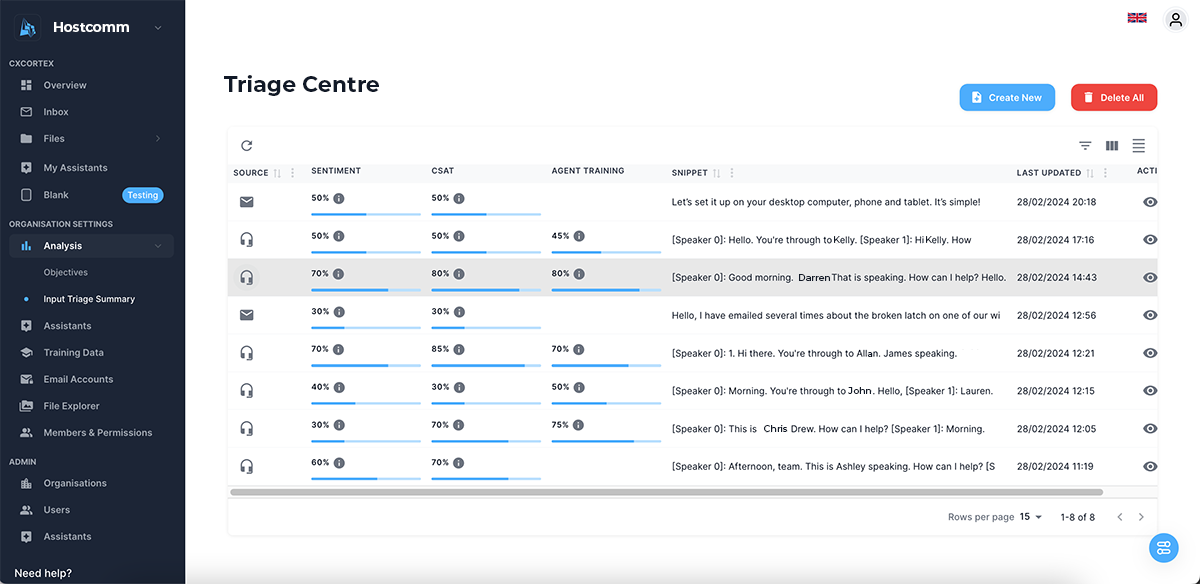In the era of instant messaging and social media, email remains a steadfast player in business communications. However, the landscape of email has undergone a significant transformation, thanks to Artificial Intelligence (AI). In 2024, AI-powered email is not just holding its ground but is leading the charge in business communications. Let's explore the top 10 reasons why AI-driven email is currently the best tool for business communications.
1. Identification and enhanced security for customer interactions
Email has emerged as a highly effective tool for customer identification in business interactions, largely due to the significant advancements in technology that make it exceedingly challenging to spoof an email address. This contrasts with chat systems, where customers often remain anonymous until they choose to reveal their identity. The evolution of AI algorithms in identifying and eliminating phishing, spam, and fraudulent content has played a pivotal role in enhancing the security of email communication. These sophisticated AI systems can discern genuine communications from malicious ones with remarkable precision, thereby reinstating trust in email as a secure and reliable medium for business correspondence. This heightened security ensures that businesses can engage with their customers through email with confidence, free from concerns about potential security breaches.
2. Advanced AI Email Triage
Advanced natural language processing and machine learning algorithms excel in understanding the content, tone, and urgency of emails. This enables them to categorise messages accurately, prioritising them based on urgency, context, and sender importance. By distinguishing between critical communications and less important messages, they prevent vital information from getting lost in the clutter. This nuanced understanding and contextual awareness of ongoing conversations and sender significance streamline the email management process, significantly saving time and reducing the stress of email overload.
Furthermore, these AI systems offer a dynamic, adaptive approach to email triaging, continuously learning and adjusting to user preferences and changing communication patterns. This adaptability ensures sustained efficiency in sorting and prioritising emails, even as business needs evolve.

3. Intelligent Auto-Responses
The evolution of AI in email communication has brought an end to the era of uninspiring and impersonal auto-replies. Modern AI technologies in email systems are now adept at crafting responses that are thoughtfully personalised, taking into account the specific content and context of each incoming message. Their responses can be produced from a sophisticated ‘neural’ knowledge base made up of historical responses, datasets and related documents. This level of customisation is achieved through sophisticated natural language processing (NLP) algorithms that can interpret the intent, tone, and subject matter of an email, allowing the AI to generate replies that are not only relevant but also appear as though they were composed by a human. This advancement marks a significant shift in how businesses interact with clients, stakeholders, and partners via email, offering a communication experience that feels much more engaging and personal.
The benefits of this AI-driven approach to email responses extend beyond mere personalisation. By providing timely and contextually appropriate replies, AI significantly enhances response times, a critical factor in maintaining customer satisfaction and trust. In scenarios where immediate human intervention isn't possible, such as after-hours queries or during high volumes of incoming communications, AI-powered responses ensure that the sender receives a prompt and relevant acknowledgment, maintaining the continuity of communication. This efficiency not only streamlines the workflow for businesses but also cultivates a sense of attentiveness and care in the interaction, thereby enhancing the overall experience for the email recipients. T
4. Automated Email Outreach
Email outreach and lead generation can be vastly improved with the use of AI, which can use its intelligence to craft and execute sophisticated, targeted email strategies that resonate deeply with the intended audience. AI has the unique ability to personalise communications at a massive scale, treating each recipient as an individual with specific interests and preferences. This personalisation is made possible by analysing large sets of data, including past interactions, purchase history, and even subtle indicators of preferences gleaned from how recipients interact with previous emails. As a result, businesses can send out thousands, or even millions, of emails that each feel as though they were tailored for a single recipient.
This approach to email marketing not only enhances the engagement levels of the campaigns but also significantly boosts the likelihood of conversion. Recipients of these AI-crafted emails are more likely to feel a connection with the brand, as the content they receive speaks directly to their needs and interests. This level of sophistication in email marketing, provided by AI tools, is transforming the face of digital marketing, making it more effective, efficient, and personally relevant to consumers in a way that was previously unattainable.
You can read up on the latest in AI Email marketing from industry leader Clay, right here: https://www.clay.com/blog/ai-s...
5. Superior CX Analytics
By analysing the nuances of customer emails, AI systems can uncover a wealth of information about customer behavior, preferences, and feedback, often revealing trends and patterns that might be missed by human analysis. Often referred to as CX Analytics this data is not just about what customers are saying, but also how they are saying it – the tone, the frequency of certain topics, and even the urgency in their queries or feedback can provide critical clues to customer satisfaction and expectations. Businesses can leverage this real-time data, extracted from everyday email interactions, to fine-tune their marketing strategies, product offerings, and customer service approaches. This kind of tailored adjustment, informed by direct customer input, allows companies to stay ahead of the curve, responding to market demands with agility and precision. In an increasingly competitive business environment, the insights provided by AI analysis of email content are not just helpful; they're essential for companies looking to maintain a deep and responsive connection with their customers.
6. Time and Resource Efficiency
By taking over the mundane and repetitive tasks such as sorting, filing, and even responding to standard inquiries, AI significantly reduces the manual workload associated with email management. This shift allows employees to allocate more time and energy to complex problem-solving, strategic planning, and creative endeavours that require human insight and innovation. As a result, not only is there a noticeable increase in overall productivity, but there's also a marked improvement in job satisfaction. Employees find their roles more engaging and fulfilling when they're not bogged down by the monotony of endless email sorting.
7. Enhanced Accessibility and Inclusivity
AI-driven email platforms are at the forefront of addressing this need by incorporating advanced translation services and voice-to-text features. These technologies break down language barriers, allowing individuals with varying language proficiencies to seamlessly interact and collaborate. The translation feature ensures that emails can be instantly translated, preserving the original meaning and nuances, thus facilitating clear and effective communication among global teams and clients. Similarly, the voice-to-text functionality is a boon for individuals with disabilities or those who prefer auditory communication, allowing them to compose and receive emails without relying solely on typing. These features not only enhance the user experience but also embody the spirit of inclusivity and accessibility in the modern workplace.

8. Better Customer Service
With the ability to provide swift and precise responses to customer email queries, AI is elevating the efficiency of email-based customer support to new heights. This technological advancement is particularly crucial in handling the volume of inquiries that modern businesses receive. AI systems can quickly parse through queries, identify key issues, and provide accurate and helpful responses, often in real-time. This rapid response capability significantly reduces wait times for customers, a critical factor in maintaining a positive customer experience. Moreover, the precision of AI in understanding and addressing specific customer concerns ensures that the responses are not only prompt but also relevant and helpful. This high level of responsiveness and accuracy in communication fosters a sense of being heard and valued among clients, which is instrumental in building customer satisfaction and loyalty.
If you are looking at using AI for customer service, you should consider platforms that support email and telephone calls, not just chat and social messaging. AI has a unifying effect on all types of messaging because it can understand language, regardless of media file. It also has a unifying effect on age demographics making it possible to provide a great email service to boomers as well as social chat messaging to Gen-Xers and Aphas.
9. Effective Archiving and Retrieval
The advent of AI systems in email management has introduced a remarkable capability for intelligent archiving and retrieval, transforming how businesses handle their communication records. These systems can meticulously categorise and store emails, not just by date or sender, but also by analysing the content and context of each message. This advanced archiving allows for quick and precise retrieval of specific emails when needed, whether for legal compliance, regulatory reviews, or historical reference. For instance, a business can easily locate all correspondences related to a particular project, customer interaction, or internal discussion, without the need for manually sifting through thousands of emails. This capability is particularly crucial for sectors where maintaining accurate and easily accessible communication logs is mandatory. AI-driven archiving ensures that essential information is securely stored and can be retrieved efficiently, aiding businesses in maintaining transparency, compliance, and continuity in their operations.
10. Continuous Learning and Improvement
AI algorithms learn and improve over time, constantly enhancing their effectiveness in managing email communications. This relatively easy to implement, continuous improvement means that the AI-powered email systems of 2024 are constantly evolving to meet the changing needs of businesses.
Conclusion
In 2024, AI-powered email stands as a beacon of efficiency, security, and personalisation in the realm of business communications. Its ability to adapt, learn, and provide tailored solutions makes it an indispensable tool for businesses looking to thrive in a fast-paced, data-driven world. As we move forward, the role of AI in transforming email from a traditional communication medium into a dynamic, intelligent business tool will continue to grow, offering exciting possibilities for the future of business communications.
If you are interested in any of the points in this article or would like to discuss how AI can be used to transform your email service please get in touch at [email protected] and 08081684400
For further information on CXCortex the AI CX analytics and customer service agent platform please visit: https://www.hostcomm.co.uk/sol...
FAQ Section relating to AI usage in Email
- How is my email account connected to AI?
- Using an OAuth connector which is the defacto method for securely connecting. It is actually quite complicated however OAuth service providers (eg Hostcomm) make it very easy because they have done all of the ground work already. The email administrator simply agrees to the Gmail/Outlook policy and connection is completed within in a few seconds. Emails are then synchronised and can be read by the AI assistant.
- How secure is it?
- Using AI to help with email communications does not compromise security because OAuth service providers (such as Hostcomm) have to be verified by Google and Microsoft to ensure they comply with security protocols. When setting up the connector you will see an Outlook or Gmail 'Verified' notification. Emails are encrypted end to end in transit using TLS and are stored in encrypted state. All data is stored in AWS or Azure in your local region, so for the UK the service complies with UK GDPR.
- Will it affect my current email set up ?
- No, OAuth connectors generally synchronise with the service provider which means your existing client is unaffected. However if you choose to respond via AI, the sent message will join a central 'thread' and appear in your sent items, just like any email client.
- Can the AI service handle multiple languages?
- Yes, many AI agents are equipped with multilingual capabilities.
- Is human intervention still necessary with AI email agents?
- While AI greatly reduces the need for human intervention, complex issues may still require human assistance. Our recommendation is to start using AI under supervision, by reviewing suggested responses and making corrections, then when you are confident in the replies you can consider moving to automated responses.
- How does the AI customer agent learn and improve over time?
- They analyse past interactions and responses, constantly refining their algorithms for better performance. This can be done under supervision or automatically.
- Can the AI customer service agent be used to generate email content?
- Absolutely, and it can use your training data, such as historical replies, product documents, terms and conditions and your web site for increased accuracy. You can also create an ideal customer service agent using a detailed prompt to add humour, charm and other personality traits.
- How does the AI handle multiple inquiries simultaneously?
- AI agents are designed to handle high volumes of inquiries efficiently, without compromising on quality.
- Are there any industries where AI customer service is particularly effective?
- AI customer service is versatile and can be beneficial across various industries, including retail, finance, and healthcare.
- What are the cost implications of implementing AI customer service agents?
- While initial setup costs may exist, the long-term ROI through efficiency and customer satisfaction is substantial.














